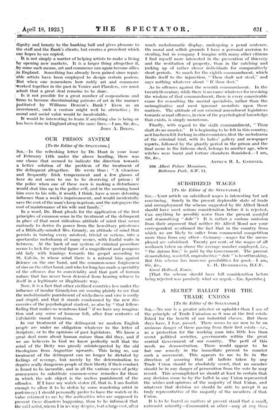OUR PRISON SYSTEM [To the Editor of The SPECTATOR.] SIR,—ID
the refreshing letter by Dr. Hunt in your issue of February 14th under the above heading, there was one clause that seemed to indicate the direction towards a better solution of the problem of the treatment of the delinquent altogether. He wrote thus : "A vivacious and frequently Irish temperament • and a few glasses of beer do not seem to me to be deserving of prison ; if the police when one of these men is making a disturbance would shut him up in the police cell, and in the morning hand him over to his wife, it would, I think, have a more deterring influence than a Week's imprisonment, and would incidentally save the cost of the man's keep in prison, and the ratepayers the cost of maintenance of his wife and family."
In a word, Dr. Hunt pleads for the application of the first principles of common sense in the treatment of the delinquent in place of that most ridiculous attitude of mind that seems curiously to derive its power from the hereditary priestesses of a Biblically-minded Mrs. Grund2,-, an attitude of mind that persists in turning every misdeed, trivial or serious, into a spectacular melodrama of many scenes, with fearful waits in between. At the back of our system of criminal procedure seems to lurk the spectral figure of a magnificent and pompous old lady with leanings towards the gospel according to St. Calvin, in whose mind there is a natural bias against Science on the one hand, and the common-sense forgiveness of sins on the other hand, and who for long has made a speciality of the offences due to conviviality and that part of human nature that has never been deterred from bearing witness to itself in a legitimate or illegitimate way.
Now, it is a fact that other civilized countries less under the influence of insular Grundyism are coming plainly to see that the melodramatic punishment of wickedness and vice is costly and stupid, and that it stands condemned by the new discoveries of the psychological student, as also by "that fellowfeeling that makes us wondrous kind" if we have any imagination and any sense of humourleft, after four centuries of Calvinistic moral terrorism.
In our treatment of the delinquent we modern English people are under no obligation whatever to the letter of Scripture, or to the opinions of past legislators. We know a great deal more about human nature than did they, and if we are believers in God we know perfectly well that the mind of the Deity was grossly misinterpreted by the -old theologians from Augustine upwards. This being so, our treatment of the delinquent can no longer be dictated by feelings of revenge, but merely by the determination to deprive really dangerous people of their liberty if their conduct is found to be incurable, and in all the various cases of petty annoyances to substitute common-sense remedies for those in which the sole• object is the useless punishment of the offender. If I have my watch stolen (if, that is, I am foolish enough to allow it to be stolen by some wandering artist in phrloinety) I should personally prefer to have the watch or its value returned to nit by the authorities who are supposed to prevent these disasters happening, than to be informed that the said artist, whom I in no way despise, is at a large cost, after much melodramatic display, undergoing a penal sentence. On moral and selfish grounds I have a personal aversion to stealing, but in company I imagine with many other. citizens I find myself more interested in the prevention of thievery and the restitution of property, than in the catching and locking up of rather clever individuals for comparatively short periods. So much for the eighth commandment, which limits itself to the injunction, "Thou shalt not steal," and says nothing whatever about "If thou dust."
• As to offences against the seventh commandment. In the twentieth century while there is no cause whatever for revoking the wisdom of that commandment, there is every conceivable cause for consulting the mental specialists, rather than the unimaginative and most ignorant moralists upon these matters. The attitude of our criminal amendment legislators towards sexual offences, in view of the psychological knowledge that exists, is simply monstrous.
Finally, with regard to the sixth commandment, "Thou shalt do no murder." It is beginning to be felt in this country, as it has been felt for long in other countries, that the melodrama of the criminal trial, with its ladies' gallery and newspaper reports, followed by the ghastly period in the prison and the final scene in the hideouts shed, belongs to another age, when witches were burnt and torture chambers flourished.—I am, Sir, &c.,
ARTHUR IL L. GARDNER.
106 Albert Palace Mansions, Battersea Park, S. W. 11.










































 Previous page
Previous page